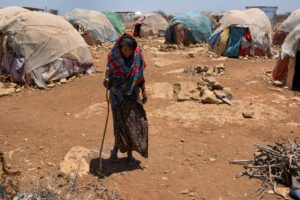by The Cowl Editor on April 6, 2017
Opinion

by Kelsey Dass ’18
Opinion Staff
“Politics without principle,” is one of the seven dangers to human virtue, as noted by Mahatma Gandhi. It is a danger we have come head to head with at this very moment.
Somalia, Nigeria, South Sudan, and Yemen are four countries currently under severe distress. With the combination of a serious drought, as well as several small wars occurring, life has become unlivable.
As a country, we are at a crossroads. President Trump is urging Congress to cut foreign aid as well as assistance to the United Nations. However, there are 20 million human lives at stake and, without assistance, the number could double or even triple.
What would Gandhi do?
Environmentalists are saying that they have not seen a drought this bad in almost 60 years. With the intensity of this drought, not only has water become less accessible, but costs have increased dramatically. Amongst such countries in Africa, where clean water is not free or readily accessible, this sort of crisis only exacerbates the dire situation. Due to the fact that clean water has risen in price, many citizens are forced to utilize contaminated drinking water and face hygienic challenges as well. Now, the people of these countries are suffering from diseases and infections from this dirty water.
The warring people in these countries do not help the famine either. Not only does war endanger the lives of people, but it also physically destroys markets and communities that provide access to food and water. The collateral damage has left the people of these countries dehydrated, malnourished, and fighting to stay alive.
President Trump wishes to decrease foreign aid and contributions to the United Nations in order to put money back into our country and our needs.
In reality, the idea of putting more money back into our own economic cycle sounds right and much needed. This is politics.
However, what does this say about Americans? Who chooses to turn their back on the lives of 20 million human beings, dying from the most intense famine we have seen in year? This is the principle.
I am not suggesting that throwing money at this situation is going to make the problem go away forever. Because it simply wouldn’t—it would act as a small Band-Aid, providing quick relief that exists on a short term scale. If we want to make a true difference in the lives of those of the global Southeast, we must recognize the interconnections we have with such countries, which is the hardest part.
This is not the first famine that countries of Africa have seen. In fact, we have seen the poverty and hunger time and time again. From the advertisements on television, calling for a dollar a month to provide clean water in a village, we know it all too well. However, why do we not question why those countries do not ever reach stability? With all of the support, all of the money, they should have already reached stability. So, where is the gap?
The gap lies among the ideals of “us” and “them.” American society has yet to push us to examine the connections between “us” and “them.” We can not see that the horrific droughts wiping out these countries are directly correlated with rising levels of pollution in our planet.
It is not the four countries being affected by the drought that contribute to these vast levels of global warming. It is us.
Just in America alone, our contribution to industrial pollution is astronomical. Factories and cars are so much a part of our lives that we don’t even think of it as pollution.
If we ever want to move out of the cycle of famine, it is essential to recognize that every action we take directly affects another human being in another place. There is no denying that our countries are interconnected. The sooner we realize that and act on it, the sooner the long term goals of eliminating famine and decreasing foreign aid can be achieved.